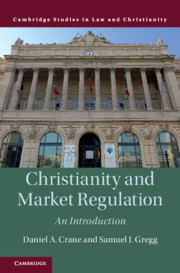Book contents
- Christianity and Market Regulation
- Law and Christianity
- Christianity and Market Regulation
- Copyright page
- Contents
- Contributors
- Acknowledgments
- Introduction
- 1 Christianity and the Morality of the Market
- 2 The Common Good and the Role of Government in Regulating Markets
- 3 Public Choice Theory and Interest Group Capture
- 4 Christianity and Antitrust
- 5 Christianity and Corporate Purpose
- 6 Is Entrepreneurship Christian?
- 7 Subsidiarity and the Role of Regulation in the Financial Sector
- 8 Christianity and Bankruptcy
- 9 Patents, Access to Health Technologies, and Christianity
- 10 Price Controls and Market Economies
- Index
8 - Christianity and Bankruptcy
Published online by Cambridge University Press: 18 June 2021
- Christianity and Market Regulation
- Law and Christianity
- Christianity and Market Regulation
- Copyright page
- Contents
- Contributors
- Acknowledgments
- Introduction
- 1 Christianity and the Morality of the Market
- 2 The Common Good and the Role of Government in Regulating Markets
- 3 Public Choice Theory and Interest Group Capture
- 4 Christianity and Antitrust
- 5 Christianity and Corporate Purpose
- 6 Is Entrepreneurship Christian?
- 7 Subsidiarity and the Role of Regulation in the Financial Sector
- 8 Christianity and Bankruptcy
- 9 Patents, Access to Health Technologies, and Christianity
- 10 Price Controls and Market Economies
- Index
Summary
The term “bankruptcy” is nowhere to be found in the Bible. It seems to have first emerged in the late sixteenth century as a concoction of “banca” and “rotta,” which together mean “broken bench.” According to a common historical account, lenders in late medieval Italy set up benches in the market square – the equivalent of hanging out a shingle – and made their loans on their benches. If a lender defaulted, his bench was broken, thus preventing him from continuing to do business. Default ended his lending career.
- Type
- Chapter
- Information
- Christianity and Market RegulationAn Introduction, pp. 160 - 181Publisher: Cambridge University PressPrint publication year: 2021

